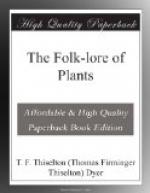“Fruit out of season,
Sorrow out of reason.”
Respecting the vine, it is said:—
“Make the vine poor, and it will make you rich,”
That is, prune off its branches; and another adage is to this effect: “Short boughs, long vintage.” The constant blooming of the gorse has given rise to a popular Northamptonshire proverb:—
“When gorse is out of bloom, kissing is out of season.”
The health-giving properties of various plants have long been in the highest repute, and have given rise to numerous well-known proverbs, which are still heard in many a home. Thus old Gerarde, describing the virtues of the mallow, tells us:—
“If that of health you have any
special care,
Use French mallows, that to the body wholesome
are.”
Then there is the time-honoured adage which says that:—
“He that would live for aye
Must eat sage in May.”
And Aubrey has bequeathed us the following piece of advice:—
“Eat leeks in Lide, and ramsines
in May,
And all the year after physicians may
play.”
There are many sayings of this kind still current among our country-folk, some of which no doubt contain good advice; and of the plaintain, which from time immemorial has been used as a vulnerary, it is said:—
“Plantain ribbed, that heals the reaper’s wounds.”
In Herefordshire there is a popular rhyme associated with the aul (Alnus glutinosus):—
“When the bud of the aul is as big
as the trout’s eye,
Then that fish is in season in the river
Wye.”
A Yorkshire name for the quaking grass (Briza media) is “trembling jockies,” and according to a local proverb:—
“A trimmling jock i’ t’
house,
An’ you weeant hev a mouse,”
This plant being, it is said, obnoxious to mice. According to a Warwickshire proverb:—
“Plant your sage and rue together,
The sage will grow in any weather.”
This list of plant proverbs might easily be extended, but the illustrations quoted in the preceding pages are a fair sample of this portion of our subject. Whereas many are based on truth, others are more or less meaningless. At any rate, they still thrive to a large extent among our rural community, by whom they are regarded as so many household sayings.
Footnotes:
1. See Akerman’s “Wiltshire Glossary,” p. 18.
2. “English Proverbs and Proverbial Phrases,” pp. 327-8.
3. “Proverbs and Proverbial Phrases,” p. 207.
CHAPTER XII.
PLANTS AND THEIR CEREMONIAL USE.




